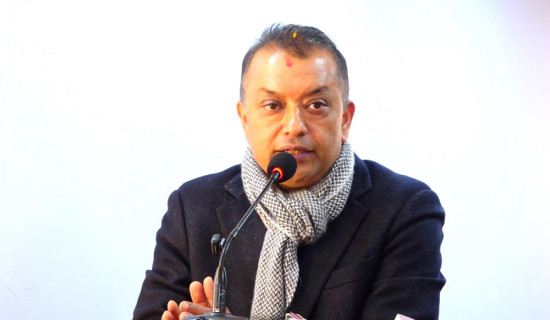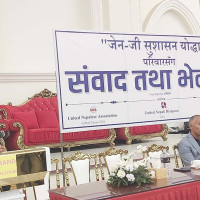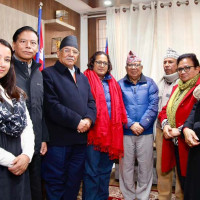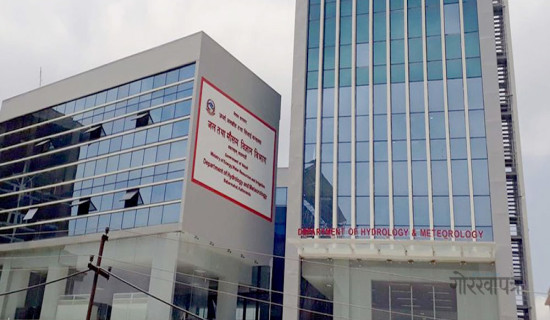- Sunday, 25 January 2026
Plans afoot to open large industries: PM
By A Staff Reporter,Kathmandu, Jan. 18: Prime Minister KP Sharma Oli has announced that large-scale industries, including iron mines and fertiliser factories, are being established within the country.
He also stated that plans are underway to revive non-operational industries with a new approach, ensuring that there is no need to worry about the consumption of the energy produced in the country.
Speaking at the silver jubilee celebration of the Independent Power Producers' Association, Nepal (IPPAN) here on Friday, he said "Since energy creates its own areas of demand, there is no need to worry about selling energy."
The government has prepared a roadmap to produce 28,500 megawatts of electricity within the next 11 years.
"We have eight industrial zones. We are opening the Dhauwadi iron mine and a fertiliser factory. Gas production will begin in Dailekh. Non-operational industries are being revived. All of these will consume energy," the Prime Minister said. "Research is also ongoing to produce green hydrogen energy. We must explore new possibilities in this sector. I highly value and appreciate the contributions of energy producers who are working to modernise and develop the country, bringing it from darkness to light. Invest boldly, there is no need to worry about investment in sharing rivers with others," he said.
The Prime Minister stated that alongside government investment in the energy sector, equal importance is being given to private and foreign investments. Addressing sceptics who believe that changes in governance have not improved the situation, he said that the success stories of producers demonstrate tangible changes in the state of affairs.
In the political context, Prime Minister Oli explained that the government has introduced ordinances to amend various laws to enhance services to the people and accelerate development.
He announced plans to present these ordinances in the parliamentary session scheduled for 15 days from now and ensure their passage within two months.
He reiterated his commitment to reducing the use of imported fossil fuels, increasing the use of renewable energy and achieving national prosperity.
Likewise, speaking on the occasion, Minister for Energy, Water Resources, and Irrigation, Deepak Khadka, urged investors to confidently invest in the hydroelectricity sector in Nepal.
Emphasising that the government is addressing all the obstacles facing the sector, he encouraged investors to move forward in their investment projects with confidence.
Maintaining that there are challenges in hydroelectric production, but the government will resolve these issues, he suggested that the government and the private sector must work together to solve those problems.
"The government and private sector have the same goals. I urge the private sector to invest without fear," he said while assuring that the facilitations would be made in issues like resuming the Power Purchase Agreements.
Speaking at a panel discussion, Chief Executive Officer of the Investment Board, Sushil Gyawali, said that the draft of the law for the implementation of energy bonds, infrastructure bonds, and other alternative financing mechanisms was in progress.
He said that the market determines investment flows, with investments from India being a notable example. He also pointed out that the Nepal Electricity Authority (NEA) holds a monopoly over electricity trade in the country, and emphasised the need for reforms within the NEA.
"If reforms are not implemented, investment will not come," he warned.
President of IPPAN, Ganesh Karki, urged the government to open up Power Purchase Agreements (PPAs) immediately to achieve the target of producing 28,500 MW of electricity.
"Without PPAs, financial management will not be possible, and the government must open up PPAs," he said.
Karki also raised concerns about the challenges with shares and IPOS (Initial Public Offerings) and said that while hydropower projects are required to go for IPOS, the Securities Board of Nepal (SEBON) is obstructing the process by denying IPO approval due to issues with net worth.
According to him, this restriction should not apply to domestic fundraising, especially when the project is funded through loans.
"The private sector is ready to invest and help achieve the goal of producing 28,500 MW within 10 years, leading to economic prosperity," he said.
He emphasised that if a suitable environment is created, the private sector, with its experience, can reach this goal and mobilise significant capital for large-scale projects.














-original-thumb.jpg)


